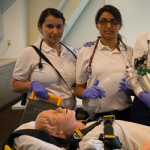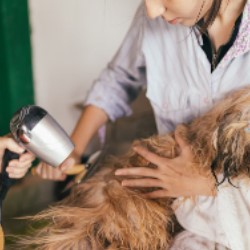Job Description: What Is A Dog Groomer?
As a dog groomer, the most common functions you may perform on any given day include a professional grooming session which may consist of bathing, combing, and trimming the coat of a dog.
In addition, you may be required to clean the dog’s ears, brush its teeth, and trim the nails of the dog.
Furthermore, you may also be required to advise owners on proper coat maintenance, identify and notify owners of skin conditions under the animals’ fur as well as other possible health conditions, and provide advice on products that the owner may need at home to properly take care of their pet.
There is no set path to becoming a dog groomer, but there are steps that you can take to help prepare yourself for a career in this field.
While a formal education is not a requirement, it does help you to secure some basic knowledge that may set you up for success.
Here are some examples of how individuals may enter this field:
- By completing a college course
- Participation in an apprenticeship
- Hands-on experience in the field
- Participation in a specialized course for dog grooming offered by a training provider
For this article, we will highlight the traditional method of entry, involving some form of formal education.
Duties
A professional dog groomer may perform any one or a combination of the following duties during the course of their day:
- Engaging with the client regarding the needs of the animal.
- Detangling / dematting the animals’ hair.
- Bath, condition, dry the animal.
- Inspecting the coat for infections.
- Trim the animal’s nails, brush its teeth, and clean out the pet’s ears.
- Shaping and styling the coat using clean, sanitized brushes and clippers.
- Accommodating a pet owner’s special requirements regarding cutting and grooming.
- Providing advice to the owner on how best to care for the coat of the animal.
- Doing routine cleaning of the work area.
- Making recommendations to pet owners regarding suitable products for pet fur coat care at home.
Salary
There are several factors that will determine the annual salary.
These may include where you live, your level of experience, whether you are booking clients full-time or part-time, whether you work for yourself or an established salon, your marketing efforts, and the services/additional services offered.
On average, the median salary for this position is $28,600.
Individuals just entering the position with little experience may expect to receive an entry-level salary of $21,380.
Those with multiple years of experience and some sort of qualification may expect to earn $38,750 per year.
Keep in mind that the salary will fluctuate depending on where you work.
For example, working in an established salon with many clients, you may earn a basic salary plus a commission.
In addition, if you own your own pet grooming company, you may earn substantially more, depending on where the salon is located.
In addition, the type of services and add-on services that your company offers may drive up your income quite considerably as well.
Annually National Average Salary: $29,520
Average Annual Salary by State
| State | Avg. Annual Salary |
|---|---|
| Alabama | $24,340 |
| Alaska | $33,650 |
| Arizona | $31,710 |
| Arkansas | $27,720 |
| California | $35,470 |
| Colorado | $31,550 |
| Connecticut | $33,790 |
| Delaware | $27,900 |
| District of Columbia | $39,560 |
| Florida | $27,400 |
| Georgia | $26,340 |
| Hawaii | $34,230 |
| Idaho | $25,760 |
| Illinois | $29,230 |
| Indiana | $26,970 |
| Iowa | $27,460 |
| Kansas | $24,950 |
| Kentucky | $26,920 |
| Louisiana | $24,300 |
| Maine | $29,990 |
| Maryland | $31,560 |
| Massachusetts | $35,030 |
| Michigan | $29,320 |
| Minnesota | $31,530 |
| Mississippi | $22,690 |
| Missouri | $28,300 |
| Montana | $27,090 |
| Nebraska | $30,230 |
| Nevada | $27,400 |
| New Hampshire | $29,780 |
| New Jersey | $31,580 |
| New Mexico | $28,290 |
| New York | $34,610 |
| North Carolina | $26,450 |
| North Dakota | $28,650 |
| Ohio | $26,840 |
| Oklahoma | $25,670 |
| Oregon | $34,180 |
| Pennsylvania | $28,710 |
| Rhode Island | $31,850 |
| South Carolina | $25,890 |
| South Dakota | $27,480 |
| Tennessee | $25,660 |
| Texas | $27,410 |
| Utah | $28,100 |
| Vermont | $32,160 |
| Virginia | $28,260 |
| Washington | $35,680 |
| West Virginia | $25,680 |
| Wisconsin | $26,160 |
| Wyoming | $27,830 |
| Puerto Rico | $21,300 |
| Virgin Islands | $30,090 |
Annual Average Salary: Top 5 States
The top earning state in the field is District of Columbia, where the average salary is $39,560.
These are the top 5 earning states in the field:
* Employment conditions in your area may vary.
A Step-by-Step Guide to Becoming a Dog Groomer
Step 1 Earn An Associate's Degree Or Participate In A Certificate Course
The first step you can take, though not mandatory, is to acquire some form of education for this position.
Various accredited schools across the United States offer associate degree courses or short certificate courses in dog grooming techniques. Some schools allow you to put your earned credits towards a bachelor’s degree.
Course duration varies from a minimum of 200 hours for a certificate course to a maximum of two years for an associate’s degree course. These courses can be taken online, on-campus, or at the grooming school’s office/salon.
It may be best to attend in-person lectures that offer hands-on training.
Students can opt to gain experience at some of the top state-licensed pet grooming schools, as these schools often run their own pet grooming salons.
These salons allow students to train under the supervision of a pet grooming instructor.
In addition, these large schools/salons often groom both pure-bred and mixed-breed dogs.
This means that students will get top-rated industry exposure and experience.
The National Dog Groomers Association, for example, offers in-person certification courses in dog grooming.
Accredited courses in dog grooming may include the following subjects:
- Animal anatomy
- Animal psychology and behavior
- Small business management and entrepreneurship
- Basic dog grooming
- Skin and coat disorders
- Bathing dogs
- Safety precautions: CPR and first aid
- How to groom corded, double-coated, and other specific breeds
- Stripping, thinning, and carding
- Clipping/scissoring techniques and tools used in grooming
- Dog handling techniques
- How to set up your own shop
- Running a mobile grooming service
- Finance and legal
- Marketing
It’s important to note that your course should ideally include business management, marketing, and financial courses as well.
Step 2 Get Experience
Students who attend a pet grooming school, may, for example, work in the on-campus salon to gain experience.
However, not all dog grooming schools have on-campus salons.
Another approach would be to try and get a job at an established pet grooming salon where you are able to work under a trained, licensed professional.
There are salons that also offer apprenticeships that help students gain valuable on-the-job training and knowledge.
Step 3 Get Certified
While this is not required, it does boost your reputation and appeal to salons and other establishments, including potential clients.
Upon successful completion of a certified course, candidates may get accreditation by taking an examination offered by the National Dog Groomers Association of America (NDGAA).
The test consists of a written test and a practical test.
Candidates are required to purchase the 14 breed profiles that highlight grooming information and acceptable patterns before sitting for the exam. Dog breeds will be divided into:
- Sporting breeds
- Non-sporting breeds
- Long-legged terriers
- Short-legged terriers
Once a candidate has successfully completed the test, the candidate will become a National Certified Member of the organization.
The fee for the exams is as follows:
- $15.00 each for Non-Sporting, Sporting, and Terrier breeds
- $25.00 for the NCMG certificate
- All four tests can be taken for $50
Step 4 Check For Licensing Requirements
Currently, there are no formal licensing requirements to practice as a professional dog groomer, but some states are actively trying to pass legislation that requires dog groomers to be licensed.
It is therefore advised to check with your state to ensure that laws have not yet changed.
Popular Programs
Education
Formal education is not mandatory, but it looks good on your resume and it does prepare you for an entry-level position.
There are various courses offered on-campus, online, or on-site at pet grooming schools.
These courses vary in length and are offered at community colleges, universities, or animal grooming schools.
Credits obtained from these courses can be put toward a bachelor’s degree.
There are, however, some minimum requirements that candidates will need to adhere to in order to enter this field:
- A high school GED or equivalent
- Proven professional experience as a dog groomer
- The ability to lift heavy equipment and/or animals
- A solid understanding of animal behavior
- Though not required but advantageous is to certification through the National Dog Groomer Association of America.
Students may expect to learn about the anatomy of the animal as well as predict and understand animal behavior.
Candidates will also learn about the various dog breeds, their coats, and any potential ailments the dog may have, as well as how to effectively identify these ailments and communicate them to the owner.
A good course may include additional subjects such as small business management and entrepreneurship, marketing, and financial management.
It’s important to familiarise yourself with the tutors on the course, their industry experience, and if they are currently employed. This will determine the overall quality of the course.
While some schools and courses offer students hands-on experience, not all do. It may be a good choice to opt for a school that can offer both practical skills as well as theoretical. It may, for this reason, be better to opt for an in-person course as opposed to an online course.
Opt for schools that offer mentorship or, at least, offer to assist you with finding the right mentor for your externship.
The course should preferably include first-aid training.
It’s not uncommon to accidentally clip a dog while grooming it. Knowing how to help the animal in the event that it gets cut or hurt is imperative and should definitely form part of the dog grooming syllabus.
Video About The Career
Licensing & Certification
The National Dog Groomers Association of America is a professional association.
The NGDAA offers certification through its National Certified Master Groomer (NCMG) program, which includes written tests and practical tests.
Students are expected to demonstrate their skills and abilities by grooming non-sporting breeds, sporting breeds, long-legged terriers, and short-legged terriers.
The written examination is based on AKC standards and includes questions related to sporting, non-sporting, and terrier group dogs.
The final examination is known as the National Certified Master Groomer Exam and entails 400 questions.
In addition, the exam covers other areas such as:
- Terminology
- Pesticides
- Health Care
- Clipper sizes and information
- Questions related to cats
The testing fee, which includes both the written and practical elements, is $125 per dog breed group.
The Master’s examination is an additional $125.
Upon successful completion, students will be registered and certified. Certification is renewable each year at a cost of $50.
Additional, and optional, international certifications include:
- The United Kingdom’s City & Guilds accredited qualifications
- A Higher Diploma in Dog Grooming offered by the British Dog Groomers Association
- The International Certified Master Groomer (ICMG) program is offered by The International Professional Groomers Inc.
- The Advanced Professional Groomer Certification (APG) program offered by The International Professional Groomers Inc.
- International Society of Canine Cosmetologists program
As of the date of writing this article, no state has yet passed legislation requiring that dog groomers be licensed.
However, many states are actively working towards this.
Average Training Program Duration: 0-1 Year
Job Outlook
According to the United States Labor Statistics, there is a projected growth of 34% through 2030 for animal caregivers and particularly animal groomers.
In addition, there is a projected 66,200 new job openings expected each year.
However, many of these job openings, as the website suggests, are largely due to the fact that many current employees are being promoted to new positions, or retire out of their current position.
The increase in annual jobs is partly also due to the fact that many more households now have pets.
This highlights a few things. The first is that there is a demand for these professionals and the second is that that demand is steadily growing.
This increase in demand is partly due to social media and the rise of famous dog groomers, such as Katy Perry’s dog groomer, Jess Rona, who have been glamorizing this job.
Employment Growth Projection: 34%
2020
2030
That's a higher than average projected growth of 93,700
Should You Become a Dog Groomer?
Overall Satisfaction: Medium

Surveys were conducted on a wide range of careers and dog groomers rated their own job satisfaction a 3.2 out of 5.
This means that in terms of career happiness, dog groomers rank in the top 50% of satisfying careers.
Average Salary: Medium

The average salary a dog groomer takes home is $28,600 ($11.42/hour).
To put it into perspective, there are a few factors that may affect the average salary, including the location of the salon, whether you work for yourself or an established salon, what incentives from part of your payment package, and years of experience.
In addition, dog groomers scored their happiness with their salary a mere 2.8 out of 5.
So while they are fulfilled in their job, they are not necessarily happy about the pay.
Job Growth Outlook: High

As previously stated, this job is set to grow by 34% through 2030.
The growth is partly due to an increased demand for dog groomers, vacancies opening up due to promotion, as well as retirement, and overall high labor turnover in this industry.
As more and more households decide to invest in pets, so does the need for pet groomers increase.
This industry is set to demonstrate a positive growth trajectory.
Education Duration: 0-1 Year

There are various courses that you may be able to attend in order to become a dog groomer.
The shortest course is a 200-credit-hour course while the longest course is a two-year associate’s degree course.
There are no minimum pass rate requirements and formal education is not required but advised.
In addition, the hands-on training and course material should prepare students to sit for the national examination.
The examination covers several breed groups of dogs and the duration of each exam differs, with the shortest being 1.5 hours and the longest being 3 hours long.
Personal Skills Needed

A good dog groomer will have the following basic skills:
- Interpersonal skills
- Analytical skills
- Physical and mental stamina
- Grooming skills
- Being familiar with animal behavior
- Knowledge of animal health
Frequently Asked Questions
How long do you have to go to school to become a dog groomer?
Formal education is not required in order to become a dog groomer.
However, there are various short courses available both online and in-class that students may attend.
The courses range in length, but the longest course is an associate’s degree course.
How much money does a dog groomer make a year?
The average salary of a dog groomer ranges from $21,380 to $38,750 per year.
However, there is plenty of room to wiggle and improve these amounts by offering additional services or working for yourself.
What kind of education do you need to be a dog groomer?
Education is not required but hands-on experience is a must.
Prospective groomers are able to work in an internship with an established salon or may opt to find work and learn on the job.
Are dog groomers in high demand?
Yes, social media, more specifically, Instagram have glamorized this job over the past few years.
This has put the spotlight on this profession.
In addition to this, many job openings are predicted due to labor turnover, a sudden rise in demand, employees being promoted out of their position, or moving on to retirement.
What skills do you need to have to be a dog groomer?
In order to be a good dog groomer, you will need:
- Attention to detail
- Interpersonal skills
- Dog grooming skills
- Knowing how to handle dogs and understanding dog behavior
- Working well independently as well as in a team
- A passion for dogs
- Excellent communication skills
- Ability to work well under pressure
 Dog Groomer Info by State
Dog Groomer Info by State

- Alabama
- Alaska
- Arizona
- Arkansas
- California
- Colorado
- Connecticut
- Delaware
- Florida
- Georgia
- Hawaii
- Idaho
- Illinois
- Indiana
- Iowa
- Kansas
- Kentucky
- Louisiana
- Maine
- Maryland
- Massachusetts
- Michigan
- Minnesota
- Mississippi
- Missouri
- Montana
- Nebraska
- Nevada
- New Hampshire
- New Jersey
- New Mexico
- New York
- North Carolina
- North Dakota
- Ohio
- Oklahoma
- Oregon
- Pennsylvania
- Rhode Island
- South Carolina
- South Dakota
- Tennessee
- Texas
- Utah
- Vermont
- Virginia
- Washington
- West Virginia
- Wisconsin
- Wyoming
Dog Groomer Resources
- 15 Pros and Cons of Being a Dog Groomer
- How Much Does It Cost to Become a Dog Groomer?
- Online Dog Groomer Training Programs
More Medical Careers
| Career | |
|---|---|
 | Certified Nursing Assistant Working as a Certified Nursing Assistant is an entry-level role that will give you hands-on experience when you are ready to take the next step in your medical career. |
 | Dental Assistant Dental assistants help dentists to provide patient care, keep records, and care for the dental equipment. |
 | Dental Hygienist Dental hygienists take care of cleaning teeth to promote hygiene and help avoid cavities and gum problems. |
 | Dialysis Technician Dialysis technicians maintain and monitor dialysis equipment, and also act as primary caregivers for patients undergoing dialysis treatment. |
 | Healthcare Administrator Healthcare administrators – also known as healthcare executives or health services managers – are responsible for the planning, direction, and coordination of medical and health services. |
 | Home Health Aide Home health aides provide home care to individuals who require assistance in their day-to-day living. |
 | Licensed Practical Nurse (LPN) Licensed Practical Nurses provide basic nursing care to patients and work with Registered Nurses and Doctors. |
 | Medical Assistant Medical assistants support the work of physicians, nurses, and other health professionals. |
 | Medical Biller and Coder Medical billers and coders manage, organize, and code various health information data. |
 | Medical Technologist Medical laboratory technologists collect bodily samples and conduct tests to analyze those samples. |
 | Medical Transcriptionist Medical transcriptionists go over voice recordings to convert them into written texts. |
 | Nutritionist As a Nutritionist, you’ll be tasked with creating meal plans, counseling, and understanding dietary restrictions for all types of clients. |
 | Patient Access Representative The work involves helping people to orient themselves to the space and everything that is going on. |
 | Patient Care Technician Patient care techs work directly with patients helping them with daily activities and assist the medical staff by measuring and monitoring the patients' vital signs among other tasks. |
 | Pharmacy Technician Pharmacy technicians provide patients with medications through prescription or over the counter. |
 | Phlebotomist As a Phlebotomist, it will be your responsibility to take blood samples from patients and send them to the lab for further testing. |
 | Physical Therapist Assistant Physical therapist assistants provide physical therapy services to patients and aide to physical therapists. |
 | Professional Recovery Coach A professional recovery coach is a life coach who works with someone during their addiction recovery process. |
 | Radiation Therapist Allied health provisional who specializes in radiation oncology treatments. |
 | Registered Health Information Technician Registered Health Information Technician (RHIT) help store and verify accuracy of health records as well as analyze patient data. |
 | Registered Nurse (RN) Registered Nurses provide hands-on patient care in various settings, mainly hospitals, and clinics. |
 | Respiratory Therapist Respiratory therapists treat and care for patients who experience breathing difficulties. |
 | Sterile Processing Technician A sterile processing technician is a healthcare professional who is responsible for preparing, sterilizing, maintaining, packaging, and storing medical tools and equipment used in surgical and other medical procedures. |
 | Surgical Technologist Surgical technologists – also known as operating room techs – prepare operating rooms and assist doctors and nurses during surgical procedures. |
 | Veterinary Assistant Veterinary Assistants work closely with Veterinarians to handle routine animal care. |
 | Veterinary Technician Veterinary Technicians assist veterinarians as well as diagnosing and treating animals, mostly in private clinics. |
 | EKG Technician EKG technicians test and monitor the cardiovascular system. |
 | EMT Trained emergency medical technician that arrives at the scene to provide medical services such as resuscitation. |
 | MRI Technologist MRI Technologists use a machine to scan the body and create a detailed image of the inside for doctors to analyze. |
 | Optician Opticians are technicians and salespersons at the same time who spends most of their day talking to customers, reading prescriptions written by doctors, and dispensing glasses and lenses. |
 | Ultrasound Technician Ultrasound technicians aid physicians in monitoring and diagnosing patients through the use of ultrasonic imaging technology. |
 | X-Ray Technician X-Ray Technicians are medical imaging professionals who use technology to visualize the inside of our bodies. |














